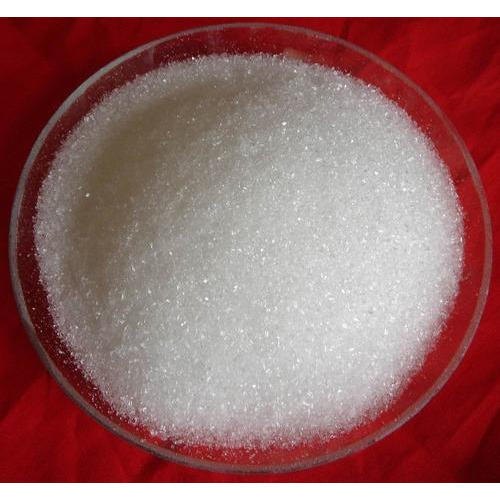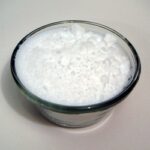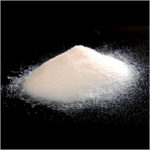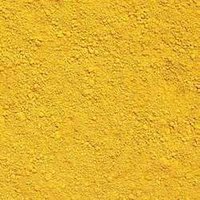EPSUM SALT (MAGNESIUM SULPHATE )
We are the stalwarts in the domain of manufacturing, supplying, wholesaling, and exporting EPSUM SALT (MAGNESIUM SULPHATE ). These flavor grade chemicals are processed using pure and accurate ingredients that are procured from reliable and trusted vendors of the market. Our range is available in the market at leading prices in packs of different quantities.
Epsom Salt, chemically known as magnesium sulfate (MgSO4·7H2O), is a compound that contains magnesium, sulfur, and oxygen.
It is commonly used in agriculture for various purposes due to its beneficial effects on plant growth and soil quality.
Here are some of the uses and applications of Epsom salt in agriculture:
Magnesium and Sulfur Source: Epsom salt is primarily used to supplement magnesium and sulfur in soils. Magnesium is an essential nutrient for plants as it plays a crucial role in photosynthesis and overall plant health. Sulfur is also important for plant growth and is necessary for the formation of amino acids, proteins, and vitamins.
Nutrient Deficiency Correction: Epsom salt is applied to correct nutrient deficiencies, particularly in magnesium-deficient soils. Symptoms of magnesium deficiency include yellowing of older leaves and poor fruit development. Adding Epsom salt can help alleviate these symptoms.
Tomato and Pepper Growth: Tomatoes and peppers, in particular, benefit from the application of Epsom salt. It is believed to improve fruit quality, increase fruit size, and enhance the flavor of these crops.

Seed Germination: Epsom salt can be used as a seed soak or a soil amendment to promote better germination. It helps with seed development and early plant growth.
Stress Reduction: Epsom salt can help plants recover from stress, such as transplant shock. It assists in strengthening cell walls and improving nutrient uptake, which aids in the recovery process.
Fertilizer Booster: Epsom salt can enhance the effectiveness of fertilizers by improving nutrient uptake by plants. It can be mixed with other fertilizers to provide a more balanced nutrient profile.
Foliar Spray: Epsom salt can be dissolved in water and applied as a foliar spray. This can quickly address nutrient deficiencies and improve the overall health of plants.
Soil Improvement: Epsom salt can improve soil structure by loosening heavy clay soils, making them more suitable for plant growth. It can also improve drainage in poorly draining soils.
Alleviating Plant Diseases: Some studies suggest that magnesium can help reduce the susceptibility of plants to certain diseases, although this effect may vary depending on the specific plant and disease.
Livestock Feed: Epsom salt can also be used as a dietary supplement for livestock, particularly for magnesium-deficient animals.
It’s important to note that while Epsom salt can be a valuable tool in agriculture, its use should be based on soil testing to determine whether magnesium and sulfur deficiencies exist. Overapplication of Epsom salt can lead to imbalances in soil nutrients, so it should be used judiciously and in accordance with recommended application rates. Always follow local agricultural guidelines and consult with agricultural experts or soil scientists for specific recommendations on Epsom salt use in your region.
Epsom salt, aside from its applications in agriculture, has a wide range of uses and applications in various other fields.
Here are some additional uses and applications of Epsom salt:
Health and Wellness:
- Epsom Salt Baths: Epsom salt is popularly used in baths to soothe sore muscles, alleviate stress, and promote relaxation. It is believed that the magnesium in Epsom salt can be absorbed through the skin, providing therapeutic benefits.
- Foot Soaks: Soaking feet in warm water with Epsom salt can help relieve foot pain, reduce swelling, and soften calluses.
- Laxative: Epsom salt is used as a saline laxative when taken orally under the guidance of a healthcare professional. It can help relieve constipation by drawing water into the intestines.
Beauty and Personal Care:
- Exfoliating Scrub: Epsom salt can be mixed with oils or creams to create an exfoliating scrub for the skin, helping to remove dead skin cells and improve skin texture.
- Hair Care: Some people use Epsom salt as a hair volumizer or to remove excess oil and product buildup from the scalp.
- Acne Treatment: Epsom salt pastes or masks are sometimes used to dry out and reduce the appearance of acne.
Household Cleaning:
- Tile and Grout Cleaner: Epsom salt can be used as an abrasive cleaner to scrub and remove stains from tiles and grout.
- Pot and Pan Cleaner: It can help remove stubborn food residue from pots and pans without scratching the surfaces.
Gardening:
- Slug Deterrent: Sprinkling Epsom salt around plants can deter slugs and snails, as they dislike the abrasive texture.
- Fertilizer for Houseplants: Epsom salt can be diluted and used as a liquid fertilizer for indoor plants to promote healthy growth.
Crafts and DIY Projects:
- Crystal Growing: Epsom salt can be used to grow small crystals for educational and artistic purposes.
- Snow-Like Decorations: When mixed with water and a few drops of food coloring, Epsom salt can be used to create snow-like decorations for crafts and holiday projects.
Fire Retardant:
Epsom salt is used as a component in some fire retardant mixtures, particularly for treating wood to reduce its flammability.
Industrial and Agricultural:
Epsom salt is used in certain industrial processes, such as in the manufacturing of textiles, paper, and dyes.
In agriculture, Epsom salt can be used as a soil amendment to improve soil quality, as previously discussed.
Animal Care:
Epsom salt can be used for hoof care in horses to reduce inflammation and promote healing.
Science and Education:
Epsom salt is used in various scientific experiments and demonstrations to illustrate principles of crystallization and solubility.
Deicing Agent:
In some regions, Epsom salt is used as a less harmful alternative to traditional road salt for deicing roads and sidewalks in winter.
It’s important to use Epsom salt responsibly and follow recommended guidelines for each specific application. While it has many beneficial uses, excessive use or ingestion can have adverse effects. Always consult with relevant experts or professionals when using Epsom salt in specialized applications, such as health, agriculture, or industrial processes.
Epsom Salt, or magnesium sulfate, has various uses and applications in agriculture
and cosmetics.
Here are some details for each:
Agriculture:
Magnesium Source:
Epsom Salt is primarily used as a magnesium supplement in agriculture. Magnesium is an essential element for plant growth and plays a crucial role in photosynthesis. A deficiency in magnesium can result in yellowing of leaves.
Soil Amendment:
It can be used to improve soil structure and fertility, particularly in magnesium-deficient soils. However, it’s important not to overapply, as excessive magnesium can interfere with the uptake of other nutrients.
Foliar Spray:

Epsom Salt can be dissolved in water and applied as a foliar spray. This method allows plants to absorb magnesium through their leaves, providing a quick solution to address deficiencies.
Stress Relief:
Some farmers use Epsom Salt as a stress-relieving agent for plants during periods of drought or other environmental stresses. It is believed to help plants cope with stress and recover more effectively.
Cosmetic Applications:
Bath Soaks:
One of the most popular uses of Epsom Salt is in bath soaks. Dissolving Epsom Salt in warm bathwater is believed to help soothe sore muscles, reduce inflammation, and promote relaxation. It is often used for therapeutic purposes.
Foot Soaks:
Epsom Salt foot soaks are commonly used to alleviate foot pain, reduce swelling, and soften the skin. Soaking the feet in warm water with Epsom Salt can be a relaxing and rejuvenating experience.
Exfoliation:
Epsom Salt can be mixed with other ingredients to create exfoliating scrubs for the body. This helps remove dead skin cells, leaving the skin feeling smoother. It’s often used in DIY beauty treatments.
Hair Care:
Some people use Epsom Salt as a scalp treatment to address issues like oily scalp or product buildup. It’s believed to help cleanse the scalp and promote healthier hair.
Remember, while Epsom Salt is widely used and generally considered safe, it’s essential to follow recommended application rates, especially in agricultural settings. Additionally, individual reactions to cosmetic applications may vary, so it’s advisable to conduct a patch test before using Epsom Salt extensively on the skin.








